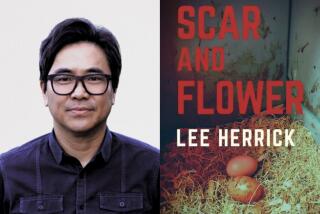Insult and injury at Bunny’s house
“Money Walks,” a serial novel by 16 Los Angeles writers who will be appearing at this year’s Los Angeles Times Festival of Books, runs Monday through Saturday until April 24. The festival takes place at UCLA on April 25 and 26.
He looked at her like she was a stupid indio who would never know how to use the gun. Then he started yelling at her in Spanish, when of course she didn’t understand a word since she was from Oaxaca and spoke Mixtec.
Theresa had seen the coyote yell at her in the same Spanish, his teeth edged with gold. The coyote had shouted for her to swim, for her brother to swim, and the swift waters of the All-American Canal had taken her brother away.
When the man and the young woman with hair like boiled yucca fiber had shepherded Mrs. Bunny through the front door, Theresa ran into the laundry room. She grabbed the box of All and went to the bedroom, where Mrs. Bunny kept a small black gun.
The man was calling her a bitch. That word she knew in Spanish and English. Then he pushed toward the closet and the space felt like a coffin. Theresa shot him in the foot. That way, she didn’t have to look up at his shouting mouth.
He fell sideways, like a cornstalk. He screamed like a pig, voice high. Until his girlfriend, with the yucca hair, hit him in the head with Mrs. Bunny’s air.
In Oaxaca, spirits in the air could invade your house at night and ruin your life. All day, the television had shown people shouting in front of banks, as if the very air had coated their lungs with chili powder.
It was all about the money. She handed Mrs. Bunny the box of All. Under a layer of detergent, Mrs. Bunny kept paper money rolled tight as flautas in Ziploc baggies. Theresa had found the box the first week she worked for Mrs. Bunny. She had known it was a test.
Mrs. Bunny didn’t know Theresa’s uncle had twice as much cash stored all over La Posada, the old motor court in Echo Park.
Mrs. Bunny sat on the bed and tried to breathe. She pointed to the blond woman and said, “An-hel.” Angel. Theresa knew that word, too.
Angel wrapped a towel around the man’s shoe, where blood had spilled out. She tied it with a satin bathrobe belt. The man slept. Angel gestured to Theresa, and they pulled him out of the house, into the Mercedes, and laid him across the front seat.
Mrs. Bunny was waiting at the front door. In her thin arms, she held a painting from her bedroom. Theresa handed the gun to Mrs. Bunny and said, “Home.”
Angel drove the big car and Mrs. Bunny sat beside her in the front seat. Theresa was in the back next to the picture, which looked like an evil spirit had spat many colors of paint onto the canvas. She couldn’t wait to be away from it.
The hills slid away. They drove back toward Los Angeles.
Angel bent forward and squinted at the addresses. Finally, Theresa tapped her on the shoulder, and Angel jumped as if burned. Theresa pointed at the corner. Mrs. Bunny looked straight ahead. Then she put her fist over the seat, and dropped a roll of money like a green cigarette into Theresa’s palm.
“Adios,” Angel said softly, and the car pulled away.
Down the block, roses spilled over wrought iron fences in front of tiny houses. New corn grew along every block wall. Ermelinda’s chickens argued under the bougainvillea. Strollers and toys were everywhere, and TVs blared from open doors. Her uncle and three other men stood in front of a house, talking loudly, pointing toward downtown.
She walked down the narrow path between the 10 blue bungalows of La Posada, where everyone was from the same small village outside Nochixtlán, knowing her uncle had seen her come home.
Straight’s most recent novel is “A Million Nightingales.” She will be on the “Fiction: Past & Present” panel at 2 p.m. on April 25 in Young Hall CS 50 at UCLA at the Los Angeles Times Festival of Books.
More to Read
The biggest entertainment stories
Get our big stories about Hollywood, film, television, music, arts, culture and more right in your inbox as soon as they publish.
You may occasionally receive promotional content from the Los Angeles Times.







